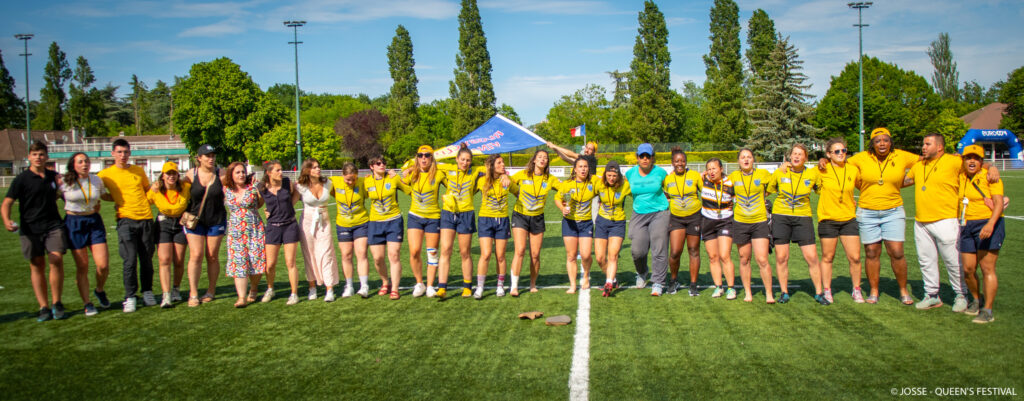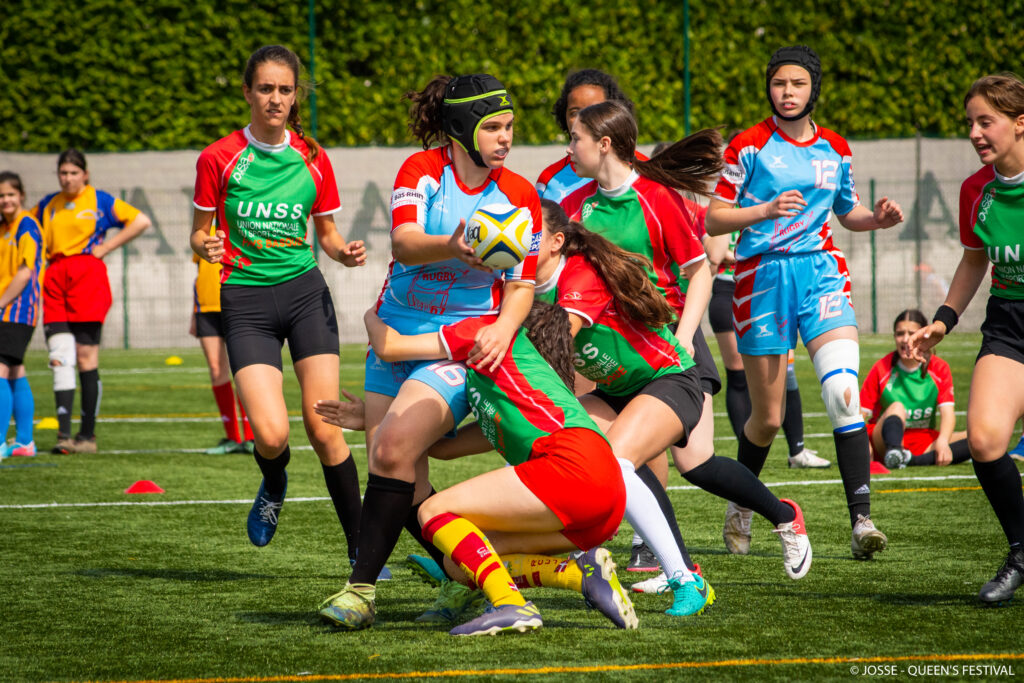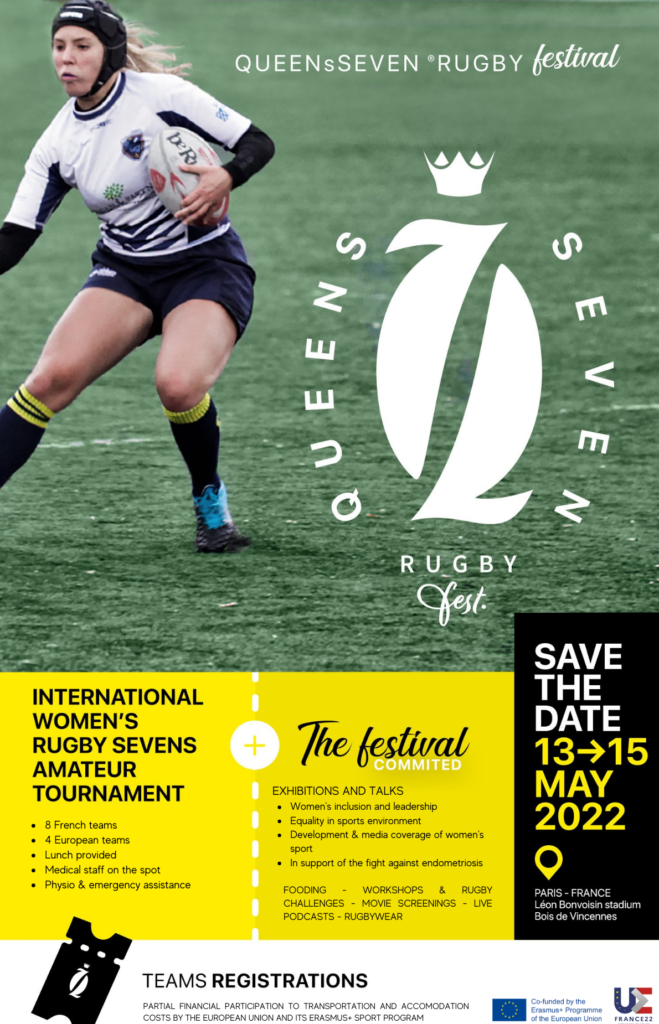
Event description
The Queens Rugby 7 Festival is the first European festival dedicated to women practicing rugby sevens. It is a vibrant week featuring three tournaments (school, university, federal), debates and conferences about women and sport, exhibitions, as well as workshops and animations.
Focus, Venue & Date
Focus: Inclusion of women and the sustainable aspect of the event
Venue: Leon Bonvoisin stadium – Bois de Vincennes, PARIS
Date: 13th – 15th May 2022

Preparation
The inclusion of women in sports is our main subject and therefore we decided to organise a women-only event. Our aim was to create an environment where women could feel empowered to express themselves both on and off the pitch, fostering a strong spirit of sisterhood throughout the event. We sought advice from the Green World Team association, which guided us on organising an eco-responsible event. However, we fell short in terms of accessibility since the outdoor rugby pitches don’t allow disabled people to play. Thanks to the work of the Irish Wheelchair Association, we now have a clear understanding of the factors we need to consider, and we will strive to improve in future events.
Implementation
Accessibility: The event venue was made accessible, and accessible bus transport was provided (located outside Paris in the Bois de Vincennes).
Inclusion and gender equity: The festival was organised exclusively for women, making it the first 100% women’s rugby sevens festival in Europe. Educational activities were conducted to boost girls’ self-confidence, discuss leadership, and inspire them to pursue careers in sport (in partnership with ENGSO).
Sustainability: Measures implemented included the use of dry toilets, glass gourds instead of plastic water bottles, water fountains, eco cups, meals served in 100% recyclable containers, and uneaten meals being donated to the humanitarian association “La Chorba”, which has been fighting hunger and social exclusion since 1998
Lessons learned?
Difficulties
Most of the challenges encountered were directly related to the Covid-19 pandemic. Changes in
regulations at the European level and in each country hampered invitations and the ability for teams
to travel freely. This also affected registration, many teams registered at the very late moment
because of the unstable situation. The pandemic also impacted the development of some teams that
we had been in contact with since 2019: some of them did not exist anymore. The pandemic also
created apprehension among some people about traveling and participating in sporting events.
The war in Ukraine also created difficulties. On the one hand, some teams were anxious about
traveling. On the other hand, the war affected the fabrication and the delivery of some materials.
A major problem we had to face was to combine the awareness workshops and the organization of
the matches. We did not take into account enough the need for rest and warm-up time for the
different teams, especially since the heat was intense during the weekend. This was also because less
teams were present than initially planned, therefore the schedule was tighter. There was also lack of
motivation of some people to participate in the workshops, but in the end, players were actually
happy to attend the roundtables and workshops.
We had to deal with broader problem: the respect of commitments. We had to face the unexpected
and late withdrawals of some teams who had committed themselves from the beginning but also the
non-arrival of some partners.
Unfortunately, because of the postponements of the festival the new dates were not the best for
many womens’ teams who had national championships and other tournament planed at the same
time they prioritized over the QR7F. It was the case both at the national and the European level and
this why some nationalities could not be present at all.
Conclusion:
Despite the health context, the Ukraine war and their direct or indirect consequences, we
managed to adapt the project as a whole and make it happen with the same philosophy we had
from the beginning. This event was also a first of its kind one as no other festival dedicated to
women’s rugby 7s amateur teams existed in Europe.
The players and team managers who responded to our questionnaire were completely satisfied
and were very enthusiastic about the idea of a second edition of the festival
The results of the questionnaire showed that all the participants had learnt more information in
at least one of these topics: endometriosis, gender equality in sports, women’s leadership
The fact of mixing several categories in a women only tournament and the presence of teams
with players of different nationalities was very much appreciated as it was the first time an
event combined all these factors. We can consider that our goal of creating a sense of community
has been fulfilled both at the level of rugby teams but also with a sorority dimension.
Even though we were limited by time constraints, having both a sport tournament and
interactive cultural and awareness activities has worked well. We think it is system that is worth
implementing more on sports events to convey more messages to the participants and enrich
their experience.
Instead of organizing a Gala Match as planned in the application, we created a « Golden Drop
Challenge » which was very successfull and enabled all the players and volunteers to participate.
The reward was a jersey from the French National rugby XV team with the signature of all the
players thanks to the quick and enthusiast response of their manager who kindly answered us
and sent the jersey right away ! We believe that mobilizing athletes and personalities from the
sports world as it was also done through the dissemination operation helped create an interest
and build legitimacy to such an event.
As we wanted to adopt eco-responsible practices we worked with an association who recovered
the extra-meals to avoid any waste of food. We also gave water bottles and eco-cups to the
players so they did not use new plastic cups or plastic water bottles during the whole time of the
event. In addition we paid attention to the carbon footprint of the event by listing the means of
transportations of the teams and participants.
The Covid crisis affected the project financially. Indeed, every year, costs were incurred to prepare
the festival and a few weeks before, everything had to be cancelled and postponed. This forced us to
start again every time the registration process, the coordination between all the associated
structures involved and redistribute the tasks between the staff. It also wearied the partners with
whom we were in discussion and disrupted the follow up of grant applications we had made. For
example, we received the validation of a request from the Ile de France region which will be
submitted to the commission on 23/09/22, that is to say more than 4 months after the event and
more than one year after its submission. It was difficult to find funds to complete the budget of
ERASMUS+. It shows a real lack in potential investments in women’s sport and especially for events
at the amateur level.
Useful ressources & documents:
Leaflet/Visual:

Final report inlcuding lessons learnt and recommendations:
More info here:
- https://www.fondationalicemilliat.com/le-queens-rugby-7-festival
- https://www.facebook.com/QR7Festival
- https://queensrugby7festival.wordpress.com/blog/
